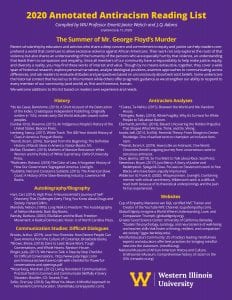WIU Summer Reading List Focuses on Raising Understanding and Awareness of Racism
MACOMB/Moline, IL – Two Western Illinois University professor emeriti who have worked extensively on cultural diversity issues and programming have compiled a comprehensive reading list to deepen understanding of the pervasive racism that has repeatedly led to violence against the Black community.
 “Given all that has been going on in the USA related to the treatment of African Americans the past few weeks, not to mention the previous 400 years, we would like to provide resources to the WIU community that further awareness and understanding of the systematic oppression and racism that is harming African American bodies and lives,” said Educational Studies Professor Emeritus J.Q. Adams. “We know that understanding is not enough. Hearts and minds must be changed and it seems to us more and more people in the USA are realizing hearts and minds cannot be separated. They are embracing the need to increase our knowledge and insight as well as deepen our empathy and compassion if we are ever to move beyond artificial categories that separate and stratify instead of accepting the fact that people, first and foremost, are human beings. We share a common humanity that unites us and provides a basis for mutual respect.”
“Given all that has been going on in the USA related to the treatment of African Americans the past few weeks, not to mention the previous 400 years, we would like to provide resources to the WIU community that further awareness and understanding of the systematic oppression and racism that is harming African American bodies and lives,” said Educational Studies Professor Emeritus J.Q. Adams. “We know that understanding is not enough. Hearts and minds must be changed and it seems to us more and more people in the USA are realizing hearts and minds cannot be separated. They are embracing the need to increase our knowledge and insight as well as deepen our empathy and compassion if we are ever to move beyond artificial categories that separate and stratify instead of accepting the fact that people, first and foremost, are human beings. We share a common humanity that unites us and provides a basis for mutual respect.”
Adams, along with English Professor Emerita Janice Welsch, gathered a comprehensive summer reading list “that provides some paths into our history and our declared values as well as paths to a more equitable and just society.”
The complete summer reading list can be found at wiu.edu/CITR/2020SummerReadingList.php.
“Recent scholarship by educators and activists who share a deep concern and commitment to equity and justice can help readers comprehend a world that continues to allow excessive violence against African Americans. Their work not only explores the roots of that violence, but also shares an understanding of the humanity of the persons who are especially hurt by that violence, an understanding that leads them to compassion and empathy,” Welsch added. “Since all members of the WIU community have a responsibility to help make the University’s commitment to justice, equity and diversity a reality, as a member of that community, you may find these works of great interest and value. Though by no means exhaustive, together they cover a wide span of historical research, explore personal narratives, analyze ideological positions, and ask readers to evaluate attitudes and perspectives based on unconsciously absorbed racist beliefs. Some underscore the historical context that has led us to this moment while others offer pragmatic guidance as we strengthen our ability to respond to every member of the WIU community, and beyond, as a human being with dignity and value.”









